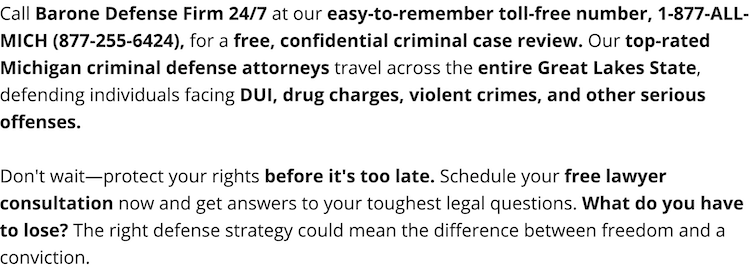Grand Rapids Guilty Pleas in DUI Cases
Many people arrested in Michigan for DUI have never been arrested before and may have never even hired a lawyer. For people facing a Michigan DUI for the first time it may be helpful to know what a DUI lawyer can do and what a DUI lawyer cannot do when handling their DUI case at trial.
Criminal Procedure
According to case law, criminal procedure, and the rules of ethics; as a general matter, a Michigan DUI client has control over those decisions deemed “personal” or “fundamental” to his DUI case.[i]
According to the United States Supreme Court, there are five decisions which are personal or fundamental, and therefore, over which a criminal defendant has ultimate control:[ii]
- To plead guilty or take steps tantamount to pleading guilty;
- To waive the right to a jury trial;
- To be present at trial;
- To testify on his own behalf; and
- To take an appeal
Reaching a Plea
These decisions amount to “basic rights that the attorney cannot waive without the fully informed and publicly acknowledged consent of the DUI client”[iii] What this means is that as a DUI client, you have total decision-making power of these decisions.
So, if your DUI lawyer thinks you should plead guilty or waive a jury trial, the court must establish that this decision is made with full information. You also cannot plead guilty to a DUI unless it is in open court and “on the record.”
In addition to these rights over which a DUI client has total control, there are five other decisions that federal and state lower court rulings have found belong solely to the DUI client:[iv]
- Waiver of the right to attend important pretrial proceedings;
- Waiver of the constitutional right to a speedy trial;
- Refusal (by a competent client) to enter an insanity plea;
- The decision to withhold a defendant’s sole defense at the guilt phase of a capital case and use it solely in the penalty phase; and
- Waiver of the right to be charged by a grand jury indictment.
For a DUI case it is almost always only the first two that are applicable. Just like the others listed, these rights cannot be waived without your consent.
Hiring An Attorney
When selecting a DUI lawyer to represent you it is important to make sure that he or she will give you all the information you need to make “fully informed” decisions. This is especially true of a decision to plead guilty. Many so-called DUI lawyers will convince you that you need to plead guilty to your Michigan DUI at your first meeting in court when you’ve had little or no opportunity to discuss your case. As shown above, this is not what the law requires.
Note: This article is based on the December 2009 Champion Magazine Article entitled Control Over the Defense: Representing Zacarias Moussaoui by Kenneth P. Troccoli.
[i] See 3 Wayne R. LaFave ET AL, Criminal Procedure § 11.6 (3d ed. 2007) at 770-74, 796 (noting that counsel generally has to follow the wishes of the client for those decisions “commonly said to require the ‘personal choice’ of the defendant”); see also Jones v. Barnes, 463 U.S. 745, 751 (1983) (referring to the “fundamental decisions” that the defendant has the authority to make); Sexton v. French, 163 F.3d 874, 885 (4th Cir. 1998).
[ii]See Jones v. Barnes, 463 U.S. 745, 751 (1983) (“It is … recognized that the accused has the ultimate authority to make certain fundamental decisions regarding the case, as to whether to plead guilty, waive a jury, testify in his or her own behalf, or take an appeal.”); Taylor v. Illinois, 484 U.S. 400, 418, n.24 (1988) ( citing with approval a decision from the U.S. Court of Appeals for the District of Columbia Circuit stating that the waiver of the right to be present during trial can only be made by the defendant and not the attorney); Florida v. Nixon, 543 U.S. 175, 187 (2004); accord 3 LaFave et al., supra note 4 at 776 (listing each of the five decisions and stating that “[t]he Supreme Court has stated, in dictum or holding, that it is for the defendant to decide whether to take each of [these] steps”); see also United States v. McMeans, 927 F.2d 162, 163 (4th Cir. 1991) (citing Jones v. Barnes, and stating that “it is the defendant who retains the ultimate authority to decide whether or not to testify”); United States v. Lawrence, 161 F.3d 250, 255 (4th Cir. 1998) (ruling that a defendant may waive his right to be present at his trial).
[iii]Taylor v. Illinois, 484 U.S. 400, 417-18 (1988).
[iv] 3 LaFave et al., supra note 4 at 776-79 (listing and digesting the supporting authorities).
 Barone Defense Firm Home
Barone Defense Firm Home
















